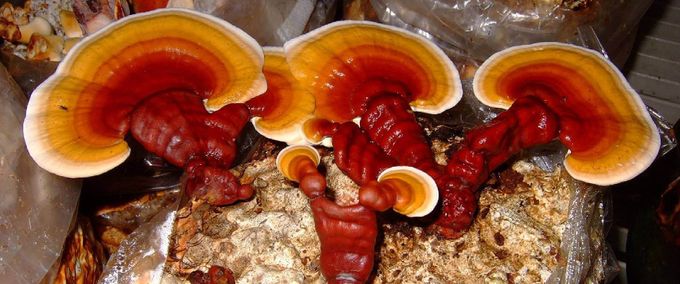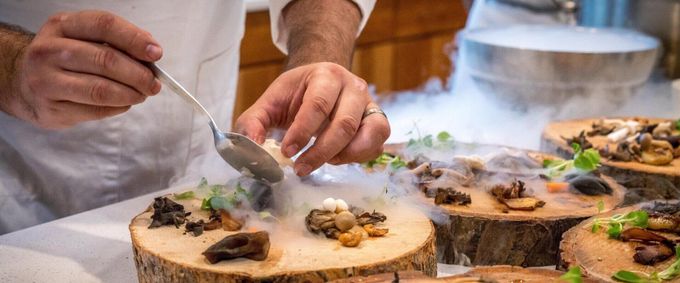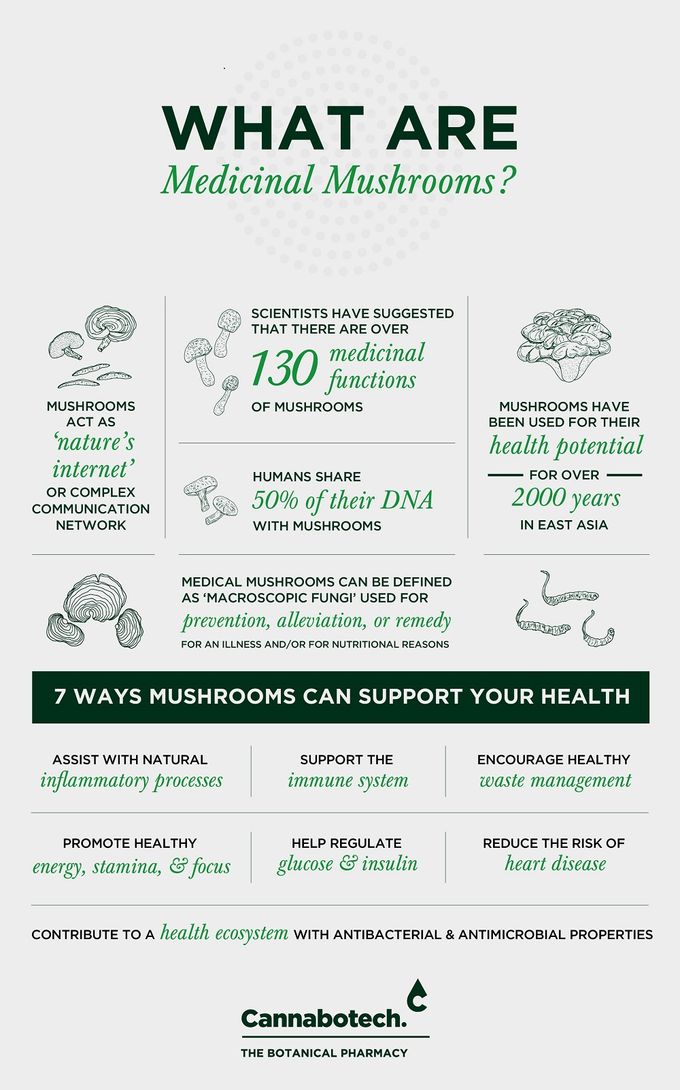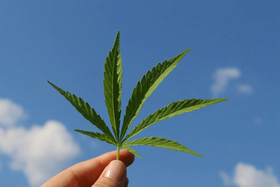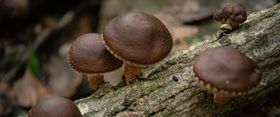Functional Mushrooms Benefits: How Mushrooms May Supercharge Your Immune System
Updated April 14, 2023.

Mushrooms have long since fascinated humans, for we have subjected ourselves to ample legends associated with outer space, fairies, witches, demons, werewolves, as well as other healing, protective, and fertility rituals(1). Functional mushroom benefits may enable you to live a healthier life in more ways than one.
But science and Western medicine has only caught up to the lore surrounding these functional mushrooms in recent years.
You might think consuming functional mushrooms, also known as functional mushrooms or traditional mushrooms, is just another health trend like the paleo diet or the plant-based diet. However, they’ve been known to East Asia for thousands of years. Traditional Chinese medicine (TCM) practitioners have been offering their patients tonics containing mushrooms to support their health, vitality, and even skincare for almost as long as the practice itself. You can even order a sweet fruity dessert soup in China containing a mushroom specifically to prevent ageing.
Now, more and more research backing these claims is surfacing. While the current research centres on oncology and immunology, the potential of these mushrooms are practically illimitable.
Thanks to functional mushrooms’ ability to support the immune system, they may create a domino effect on all other physiological systems in our body.
Research suggests that they may affect:
- How we sleep.
- Respond to illness.
- Handle stress.
- Recover from exercise.
- Process fats and sugars.
- Show ageing on our skin.
- And more.
We’ll get into further benefits below. But let’s first explore what functional mushrooms are. Then we’ll explore how they may benefit your diet and preventive care plan.
What Are Functional Mushrooms?
To date, there are believed to be over 2000 mushrooms in nature(2), with only about 25 accepted as food. Of this group, only a handful of them are recognised as ‘functional,’ yet this group of fungi have garnered particular attention from Western scientists and clinicians alike in recent years(3).
The premier thought leader in mycological research, Paul Stamets, believes that ‘’Fungi are the interface of organisms between life and death – without them, all ecosystems would fail.’ (4) We can venture to say that this includes the ecosystem of the human body.
Haifa University Professor and renowned mycologist, Dr Solomon Wasser, has asserted that there are more than 130 functions of these fascinating forest dwellers(5).
Preliminary scientific research has suggested that functional mushrooms may have the following benefits:
- Immune system regulation
- Antioxidant properties
- Cardiovascular support
- Brain and cognitive support
- Energy and stamina
- Antiinflammatory properties
- Adaptogenic properties (helping balance physiological responses to stress)
- Liver protection
- Antimicrobial and antibacterial properties
- Antiviral properties
- Antifungal properties
- Insulin and glucose regulation
- Assistance with weight control
- Antitumor activity
- Skin health
- And more
While the West does not have sufficient studies on functional mushrooms to satisfy regulating bodies quite yet, one revolutionary discovery worth noting is the invention of the immunosuppressant drug, Cyclosporine. The active ingredient is derived from Tolypocladium inflatum gams, the anamorph or asexual stage(7) of the better known Cordyceps mushroom. Thanks to this drug, organ transplants were made possible in the 1970s and 1980s(8). If you don’t suppress the immune system after a transplant, your immune system can attack a foreign entity it doesn’t recognise, including another human’s organ. By suppressing the immune system with cyclosporine, the body was able to accept the new organ in the body.
As long as we are on immunity, we can’t forget Ganoderma lucidum, most commonly known by the Japanese term reishi. This mushroom is also gaining rapid traction in the Western world due to its ability to support the immune system. But it is thought to do so much more. In fact, the word for the Ganoderma lucidum (Reishi) in China is lingzhi, meaning ‘the mushroom of immortality.’ because TCMs practically used the mushroom to treat everything from the natural signs of ageing to stress to mitigating symptoms of serious illnesses. It was even thought of as the “herb of spiritual potency,”‘(9) (although it’s not a plant. It earned a kingdom all of its own).
Then there is the Snow Fungus (Tremella fuciformis) the beauty industry is absolutely raving about(10) now, although it has been a delicacy in East Asia for years due to its ability to support skin health. It contains 500 times its weight in water and is packed with plant collagen, giving hyaluronic acid a run for its money — the other fan favourite of the beauty world due to its similar humectant properties. In lay person terms, a humectant can actually draw moisture from the air and inside your body, which helps reduce water loss. When your skin is moist, it looks more healthy and youthful.
That’s just brilliant for those looking for more natural products for their skin. It has been traditionally used in Chinese desserts, but now it is becoming increasingly popular in cosmetics and dietary supplements.
From here, the possibilities are endless.
In short, you name it and there is probably a mushroom partner that can accompany you on that health or wellness journey. Cannabotech is investing ample resources to continue studying these magnificent organisms to further uncover their many wonders.
Nutritional Value of Functional Mushrooms
If you’ve jumped on the vegan train, you’ve probably eaten a mushroom burger by now. That chewy, savoury (umami) taste of mushrooms makes an excellent meat alternative. However, it’s not only the taste that makes them great for vegetarians and meat-eaters alike.
These nutrient-rich, low-fat, low-sodium wonders only now getting the attention they deserve among the superfood junkies, so much that some non-governmental organisations (NGOs) believe mushrooms just might resolve world hunger not to mention ecological problems.
Here’s just a glimpse of what these nutritional superstars can do for you.
1. Mushrooms provide an excellent source of protein.
Mushrooms contain up to 40% of protein in dry weight.
2. Mushrooms provide low-glycemic carbohydrates, making them suitable for a keto diet.
These may include natural sugars including trehalose and mannitol, fibre, and polysaccharides such as beta-glucans, glycogen, hemicelluloses, chitin, and pectic substances.
3. Mushrooms are antioxidant powerhouses.
Antioxidants are essential for counteracting damage caused by environmental toxins, supporting a healthy ageing process, providing some protection against serious diseases like cancer or heart disease, and more. They contain an array of antioxidants such as beta-carotene, choline, selenium, lutein, lycopene, vitamin A, vitamin C, vitamin E, and polysaccharides (especially β-glucans, which also have been touted to promote extensive biological activity beyond antioxidant properties).
4. Mushrooms are packed with B vitamins.
Many mushrooms contain an array of B vitamins including thiamine (B1), riboflavin (B2), niacin (B3), pantothenic acid (B5), folate (B9), and cobalamin (B12); which play a vital role in our ability to sustain energy, concentrate, remember information, and more(11) 2. To date, mushrooms are one of the few vegan sources of B12 (particularly shiitake and lion’s mane, making them an important staple in a vegan diet(12).
5. Mushrooms contain ample essential minerals.
These minerals include magnesium, selenium, phosphorus, calcium, iron, copper, potassium, and more.(13)(2) In fact, you might be able to get more potassium from a mushroom than a banana!
You might guess by now why functional mushrooms are often interchanged with functional mushrooms — because they can help the body function healthily.
But you don’t need science to tell you how your body reacts to food. If you have ever binged on burgers and fries, you know what we mean. Luckily, if you’re one of those people with a dodgy diet, mushrooms just may help you get back on track with their functional properties. If you’re not keen on cooking, you can start by taking dietary supplements.
How Mushrooms Contribute to a Healthy Ecosystem: Benefits for the Body and Planet
Thought leaders like Paul Stamets believe that mushrooms act as ‘nature’s internet,’ likening them to the cellular networks in the human brain. But for you techies, think of them as complex operating systems like Microsoft Windows or MacOS for our body.
Mushrooms provide forests with a:
- Digestive system
- Nervous system
- Immune system
- Hepatic system
- Renal system
- Respiratory system
- And more
To put it simply, mushrooms essentially operate like us. In fact, they share 50% of our DNA! So if you’re theoretically half a mushroom, it is highly conceivable to think that a mushroom can support your ecosystem as well.
We share many of the same pathogens as well as similar protective mechanisms. So when you’re looking to support your health, you can start by looking for a substance your body recognises as its own — a mushroom. If this doesn’t demonstrate our symbiotic relationship with the natural world, what will?
Introducing Mushrooms to Your Preventative Care Routine
You may have guessed by now that functional mushrooms can help you amplify your immune system, making them an important aspect of preventive medicine. By implementing mushrooms into your diet, including supplements, you can stave off illness and injury better by decreasing risk factors. Moreover, a preventive care plan can also help you bounce back faster from whatever ails you, should you find yourself in a place of recovery.
Mushrooms may help you reduce the risk of:
- Illness
- heart disease
- sleep disturbances
- stress and mood issues
- memory and focus impairment
- sugar spikes and crashes
- muscle and joint fatigue premature ageing
- and much more
To put it simply, mushrooms can help you supercharge your preventive care routine.
Disclaimer: This article is for educational purposes only. This article and our products are not intended to diagnose, treat, cure, or prevent any disease; or replace a healthy lifestyle and diet. Speak to your family physician or treating physician if you have any serious concerns about your health before starting a new health and wellness routine.
DO NOT EAT any mushrooms that you are not 100% sure are safe for consumption.
References:
- Herbal Academy. The Mushroom Course: Lesson 2, Fungi in Folklore. Lecture presented online; March 11, 2021.
- Valverde M E, Hernández-Pérez T, Octavio Paredes-López. Edible Mushrooms: Improving Human Health and Promoting Quality Life. International Journal of Microbiology, 2015. Accessed online March 29, 2021. https://doi.org/10.1155/2015/376387
- Brendler T, Al‐Harrasi A, Bauer R, et al. Botanical drugs and supplements affecting the immune response in the time of COVID‐19: Implications for research and clinical practice. Phytotherapy Research. 2020; 1– 19. https://doi.org/10.1002/ptr.7008
- Hawkins, D. CASE STUDY: how mushrooms can save forests. Ecologist. October 21, 2009. Accessed March 29, 2021. https://theecologist.org/2009/oct/21/case-study-how-mushrooms-can-save-forests
- Wasser SP. Medicinal Mushrooms in Human Clinical Studies. Part I. Anticancer, Oncoimmunological, and Immunomodulatory Activities: A Review. Int J Med Mushrooms. 2017;19(4):279-317. doi:10.1615/IntJMedMushrooms.v19.i4.10. PMID: 28605319.
- Lindequist U, Kim HW, Tiralongo E, Griensven LV. Medicinal Mushrooms. Evidence-Based Complementary and Alternative Medicine. 2014. Accessed online March 28, 2021. https://doi.org/10.1155/2014/806180.
- Hodge KT, Krasnoff SB, Humber RA. Tolypocladium Inflatum is the Anamorph of Cordyceps Subsessilis. Mycologia. 1996; 88(5) :715-719. Accessed March 19, 2021. doi:10.2307/3760965. https://www.jstor.org/stable/3760965
- Mak TW, Saunders ME, editors. Transplantation. In: The Immune Response. Academic Press, 2006; p. 873-921. Accessed online March 28, 2021. https://doi.org/10.1016/B978-012088451-3.50029-6.
- Wachtel-Galor S, Yuen J, Buswell JA, et al. Ganoderma lucidum (Lingzhi or Reishi): A Medicinal Mushroom. In: Benzie IFF, Wachtel-Galor S, editors. Herbal Medicine: Biomolecular and Clinical Aspects. 2nd ed. Boca Raton, FL: CRC Press/Taylor & Francis; 2011. Available from: https://www.ncbi.nlm.nih.gov/books/NBK92757/
- Devash M and Norris R. The Benefits of Adding Snow Mushroom to Your Skin-Care Routine. Allure. November 15, 2018. Accessed April 02, 2021. https://www.allure.com/story/snow-mushroom-skin-care-benefits
- Kozarski M, Klaus A, Jakovljevic D, et al. Antioxidants of Edible Mushrooms. Molecules. 2015;20(10):19489-19525. Accessed March 28, 2021. doi:10.3390/molecules201019489
- Watanabe F, Yabuta Y, Bito T, Teng F. Vitamin B₁₂-containing plant food sources for vegetarians. Nutrients. 2014;6(5):1861-1873. Accessed March 28, 2021. doi:10.3390/nu6051861
- S. E. Mallikarjuna SE, Ranjini A, Haware DJ, Vijayalakshmi MR, et al. Mineral Composition of Four Edible Mushrooms. Journal of Chemistry. 2013. Accessed online March 27, 2021. https://doi.org/10.1155/2013/805284
- Hasler CM. Functional food: The western perspective. Nutr Rev. 1996;54:506–10. In Ganeshpurkar A, Rai G, Jain AP. Medicinal mushrooms: Towards a new horizon. Pharmacogn Rev. 2010;4(8):127-135. Accessed March 27, 2021. doi:10.4103/0973-7847.70904



